PURO People: Paweł Oszczyk
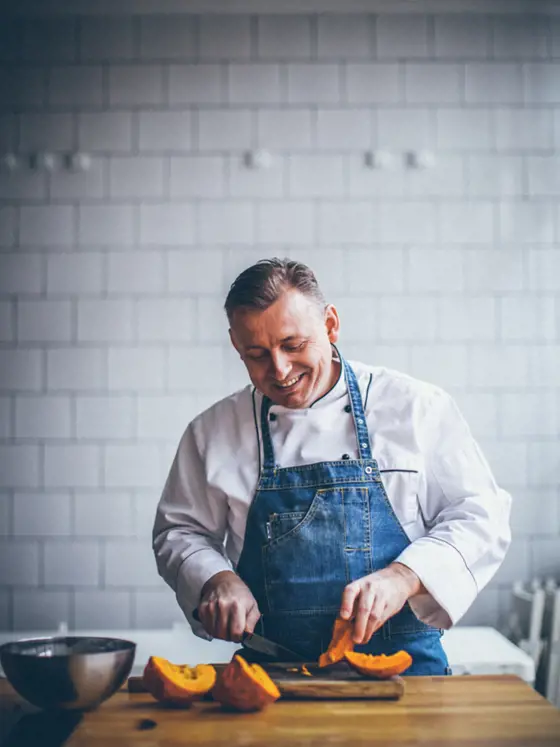
Paweł Oszczyk in an interview with Basia Starecka
photos: Monika Walecka
How long have you been working in gastronomy?
29 years.
So you started before it got fashionable!
I was lucky enough to be part of a revolution that changed the landscape of gastronomy in Poland. I started working in the 1990s, the decade everything began to change.
How did you begin? Washing the dishes?
Even better. Following my graduation, I was extremely lucky to start working in Miramonti l'Altro—a one-star restaurant in Italy. I worked there for two years and would have stayed longer if it hadn’t been for the one-of-a-kind chance to join the team that was opening Hotel Bristol in Warsaw.
Legend has it that Bristol of the 1990s epitomized luxury and culinary abundance.
Indeed, the hotel signified a significant turn from the decade when Orbis hotels were the best you could get in terms of elegance. Don’t get me wrong, I have a very fond memory of them—I was an intern at Hotel Europejski—but Bristol opened the door to the great world and money. Back in the nineties, the hotel was called Le Royal Meridien Bristol, for it was part of a British chain known for its unusually high standards. The kitchen was pure perfection; I worked with Kurt Scheller with whom I introduced the soon-to-be-famous Sunday brunches. This was truly a novelty, the concept completely unknown in Poland. Tables were sagging under the weight of sturgeon caviar. Such an abundance could be enjoyed only in the nineties - what’s left now is nostalgia. I remember how, on my way to work, I would pass the room for 168 guests knowing it would be bursting at the seams during the day and that we, the chefs, would soon have our hands full.
Was it worth putting all that caviar on the tables?
Absolutely. In fact, the clientele liked it very much. We should remember that Bristol was the place where the first fortunes were celebrated. That’s also when I met people who would visit me later in the Polish Business Council Club at Sobański Palace. We grew up together—in a way—they got richer while I got more and more experienced in culinary terms. I worked at Bristol from 1992 to 2001 and eventually became the head chef.
I believe Bristol was the only place in Warsaw that served sturgeon caviar, wasn’t it?
We were number one, certainly. I believe it would be difficult to find a place with comparably high standards. Marriott, a bit older from us, was our only competition. Back then, our restaurant used to be packed with people. Every day, we prepared as if we were going to war because we couldn’t afford any mistakes. Those were the times when deliveries weren’t working as well as they do now. We had one man hired exclusively for the purpose of going to Berlin and Hamburg to fetch necessary ingredients. He would bring not only fish, but also portioned yoghurt that looked great on the breakfast buffet but was nowhere to be found in Poland.
What else did the elite of the 1990s eat—caviar aside?
We served baked turbot with burnt butter, lemon, and capers. I remember us once having a problem fitting the fish in the oven because it was flat and weighed seven kilograms. All it had were delicate diamond-shaped cuts all over it sprinkled with olive and rosemary. Once it was done, we served it whole on a huge platter. Kurt Scheller believed in classic cuisine, so our main dishes included French terrine, fish in gelatin, ribeye roast, ham wellington, and turkey with chestnuts and cranberries. They aren't that popular any more. Now, food is less processed and fresher than it used to be.
Do you remember what you used to cook back then?
I do. Tuna tartare and smoked duck breast with mango and spinach. The latter was a roulade, I believe.
Would you serve these dishes today?
I would serve tuna. It’s been with me for many years now. Duck? I don’t think so; but it was very tasty.
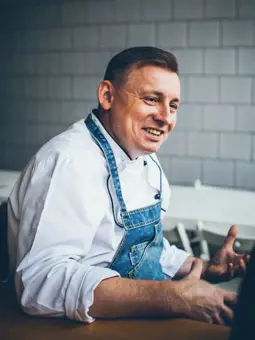
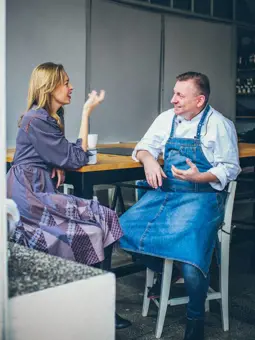
In 2001 you changed Bristol for the Polish Business Council Club at Sobański Palace where guests did not celebrate their first fortunes but talked about the ways to multiple the ones they already had.
The way I landed the job at Sobański Palace was not typical. The owner of the palace, Jan Wejchert—may he rest in peace—called me and asked if I could take a few days off at my current job. I agreed. He put me on a place to Lausanne and I ended up in a prestigious culinary school that was in charge of selecting the new chef for the Club. I was asked to prepare lunch and spend the days doing all kinds of training. Eventually, I worked at Wejchert’s for two and a half year. I had a lot of freedom so I could let off my creative steam, but I worked at a breakneck pace. A new lunch was to be prepared daily; once a week I compiled a tasting menu and, if it wasn’t enough, I was in charge of parties, catering, and banquets. I worked from eight o’clock in the morning until midnight, but that’s when I learnt how to be a manager, keep the books, and take responsibility for my team and the logistics of its work.
Year 2000 saw a rapid development of gastronomy in Warsaw.
Yes, it did. That's when the first private restaurants started appearing in the city. Delivery companies offered better quality meat, fish, and seafood. At the beginning, they worked only on Thursdays, but after a while they started working full-time so we could have fresh ingredients all week long. However, it took years to eradicate the notion of "delivery Thursdays" from our guests' minds. They would come certain that fresh fish was available exclusively on that particular day of the week. In that period, I changed Sobański Palace for La Regina—a newly-opened hotel in Warsaw's New Town (Nowe Miasto). I was given carte blanche, which is why, I guess, I spent 13 years running their restaurant—La Rotisserie. I served dishes inspired by Polish and French cuisine but gave them a modern twist. I can say one thing for sure: after everything I have experienced in the world of gastronomy I feel culinarily fulfilled.
How are PURO Hotels different from the ones you've worked for?
PURO does away with hierarchy and structures, seeing value in teamwork, equality, and openness to others. We seek inspiration and motivation in one another while, in the past, all that mattered in the restaurant world was prestige, salary, and stability. The chef was expected to manage and give orders. Today, chefs must find in themselves the talent to inspire young cooks and provide them with room for creativity. That's the only way they can earn their trust. Let's take a look at the day-to-day routine at one of our restaurants. In Wroclaw-based Hint, cooks take turns coming up with lunch ideas so that the course can change daily. The team follows the schedule and each member of our team can hone their skills and develop unique visions.
And what is it exactly that you do as a culinary director?
I am in charge of developing the concept that defines the character of each restaurant. I see how it becomes the reality, recruit chefs and cooks, oversee their work and keep the books. Truth be told, I use every bit of my professional experience, but on a larger scale. Each new PURO space, be it hotel or its restaurant, is originally and meticulously designed, which is also what distinguishes this particular chain from others. With no established scheme or universal vision, we match the concept behind each restaurant to the character of the city and its inhabitants. That's why each place is so quintessentially local.
I've got an impression that—contrary to other hotel restaurants—PURO restaurants are more open to non-hotel guests.
Hotel restaurants are considered to be exclusive places. With PURO it's different. Our prices are not exorbitant. You don't have to pay for a golden chandelier, expensive curtains and three sets of cutlery. I'd say we're much closer to an unassuming bistro than a fine-dining restaurant. We're not about making art for art's sake. We're serving real food.
Tell us more about local food at PURO.
The first PURO hotel opened in Wroclaw. Its restaurant—the already-mentioned Hint—is probably the most informal of all PURO restaurants because it's based on street food. The menu offers various sandwiches—warm challah with orange confiture, rucola, poached egg and cheddar or focaccia with grilled vegetables, feta cheese and tofu—as well as meals to satisfy a greater hunger, for example classic ribs in plum sauce or potato waffles with pulled pork and sour cream.
What about Poznan? Do you serve "gzik"?
Yes, we serve potatoes with gzik (translator's note: "gzik" is a traditional cottage cheese dip). The chef at Nifty No. 20 is from Poznan, so the menu includes local dishes such as "ślepe ryby" (potato soup, translated literally as "blind fish") with smoked catfish and goose with red cabbage. Nifty is a spacious and modern bistro with the bar in the center and a separate entrance from the street. It's a popular meeting spot for the people of Poznan.
You’ve recently opened the second hotel in Krakow.
Yes. In Krakow's Kazimierz. With 228 rooms, it's a bit bigger than the one located close to the train station. That's where, for the first time, we opened a bakery and a cafe in one, so that anyone can drop by every morning for freshly-baked baguettes and sweet buns or a bowl of porridge. Most importantly, our Kazimierz-location boasts Halicka Eatery & Bar run by a very culinarily mature and ambitious chef—Miłosz Kowalski—who takes from the local tradition and uses local products. The menu includes local trout, cheese, lamb meat, and wild boar goulash with chestnuts. The last one is my favorite. Only a few can cook game properly, and Miłosz really knows how to do it and his stew is absolutely amazing. If you like, you can see him at work because Halicka has a partially open kitchen to shorten the distance between guests and the team. For a change, our first location, the smaller one (with 130 rooms), offers homemade pasta—a rarity even now. Very few places make Italian pasta from scratch. District One is a classic brasserie, but with a local vibe—the menu offers traditional bagels, but with kohlrabi and pulled pork.
We still have some time to go to the seaside and talk about PURO Gdansk and its Dancing Anchor.
Dancing Anchor is a beautiful and spacious restaurant with industrial touches inspired by the shipyard and the Granary Island. Like Halicka, it also has an open kitchen—you can choose comfortable seats right next to it and experience the cooking process with your own eyes. In the menu, fish and seafood meet pork and poultry, with three most famous picks being crispy bacon with a hint of refreshing watermelon, grilled chicken hearts, and calamari in Asian spices.
PURO hotels in Warsaw and Lodz are opening this year.
And I can reveal a secret or two about the menus to come. Lodz will be all about vegetables and grains, while in Warsaw we will be promoting a less known side of Italian cuisine. We'll serve pizza too.
What do you cook at home?
Meals that are very easy to prepare, but also very tasty. We eat a lot of soups such as barley soup, sorrel soup (schav), pumpkin cream; I often make braised beef cheeks and cod with baked cauliflower. I am a father of three, so my house is always full. Every Friday I do shopping with my wife and we always find ourselves wondering how many people will come to dinner. If we're expecting crowds I usually prepare a delicious one-pot meal, put it in the middle of our large table and serve with crispy bread. I like how easily it crumbles and the feeling of its texture. These are our rituals. What gives my life meaning at the very moment is the feeling of harmony between professional and family lives.
The photo session took place in Cook Up studio in Warsaw. Thank you!
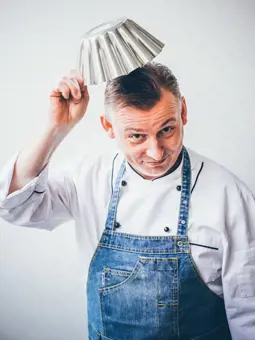
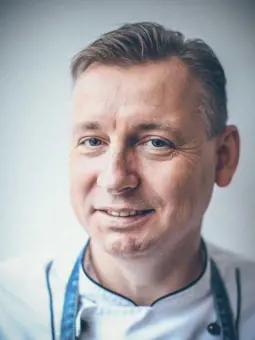
Similiar Articles
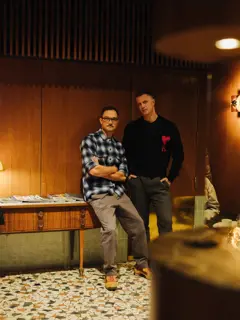
- Trend
- People
- Poland
Lukullus – delicious and beautiful pastries from Warsaw

- Trend
- Art
- People
- News
- Poland
Bielska Jesień – interview with Ada Piekarska, curator of poland's premier painting competition
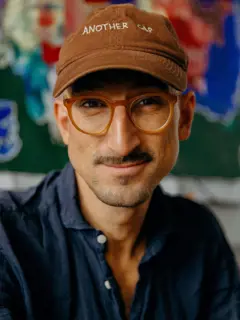
- Trend
- News
- People
- Poland
